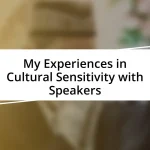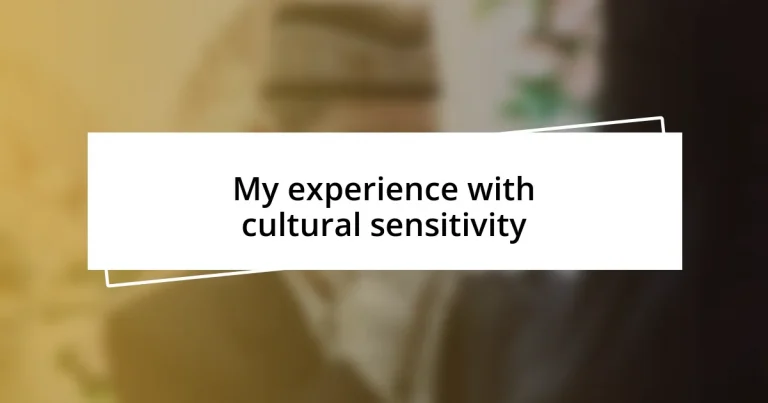Key takeaways:
- Cultural sensitivity involves awareness and respect for diverse backgrounds, enhancing connections and fostering acceptance in interactions.
- Active listening and seeking feedback are vital strategies for practicing cultural sensitivity, creating safe spaces for meaningful dialogue.
- Challenges such as assumptions, language barriers, and conflicting values can hinder cultural sensitivity, requiring patience and open-mindedness to navigate.
- Embracing cultural sensitivity enriches personal identity and relationships, inspiring creativity and fostering deeper understanding among individuals.
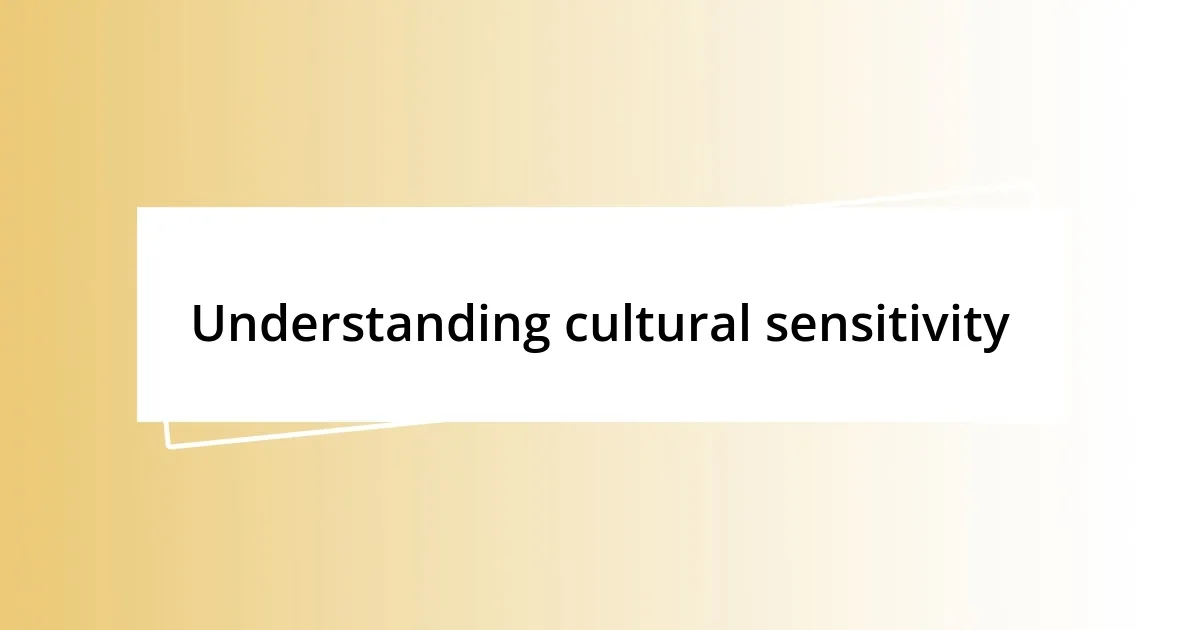
Understanding cultural sensitivity
Cultural sensitivity is more than just a buzzword; it’s a deep awareness and respect for the diverse backgrounds, traditions, and beliefs that shape our interactions with others. I remember attending a friend’s wedding where different cultural practices were beautifully blended. Witnessing how everyone cherished those unique elements made me realize just how enriching it can be to embrace diversity.
Have you ever found yourself in a situation where an innocent remark turned uncomfortable? I once asked a colleague about their cultural holiday, and instead of a conversation, I saw a flicker of discomfort in their eyes. That moment taught me the importance of understanding the significance behind cultural traditions and how my curiosity, while well-intentioned, could unintentionally offend.
To truly grasp cultural sensitivity, we must actively listen and learn from one another. For instance, during a community event, I engaged with individuals from various backgrounds, and their stories deeply moved me. It was a reminder that embracing cultural differences not only fosters acceptance but can also lead to meaningful connections. Each person’s experience is a piece of a larger puzzle that enriches our collective understanding.
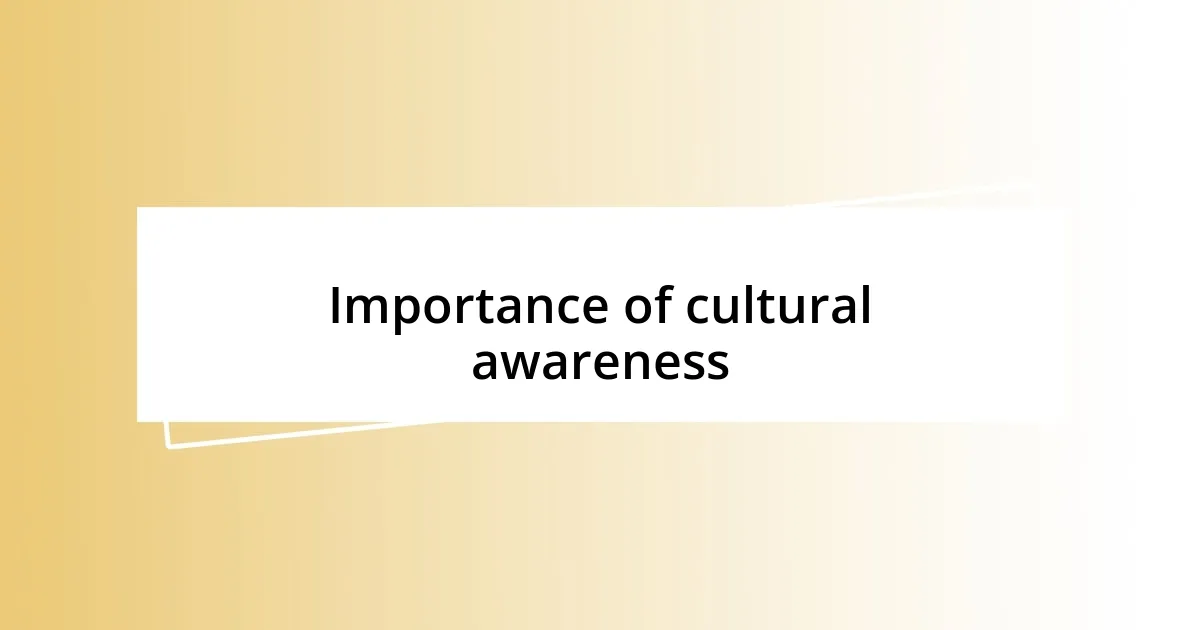
Importance of cultural awareness
Cultural awareness is crucial in today’s interconnected world. I recall a time when I traveled abroad and found myself navigating social situations with people from various cultures. Each interaction reminded me that understanding cultural nuances can significantly enhance communication and cooperation. When I took the time to learn about local customs, I often found people more welcoming and willing to share their stories. It showed me firsthand how respect and recognition of cultural diversity can open doors.
Here are some key reasons why cultural awareness matters:
– Builds Trust: Acknowledging different cultures creates an environment of respect, fostering trust among individuals.
– Enhances Communication: Understanding cultural contexts helps prevent misunderstandings that can arise from differing communication styles.
– Promotes Inclusion: When people feel valued and understood, it leads to greater participation and collaboration.
– Encourages Empathy: Recognizing others’ experiences nurtures emotional intelligence, allowing us to connect on a deeper level.
– Facilitates Conflict Resolution: Cultural awareness enables us to address conflicts by understanding underlying cultural motivations, leading to more effective resolutions.
By prioritizing these aspects, I’ve found that interactions become more enriching, turning what could be a simple exchange into a compelling dialogue.
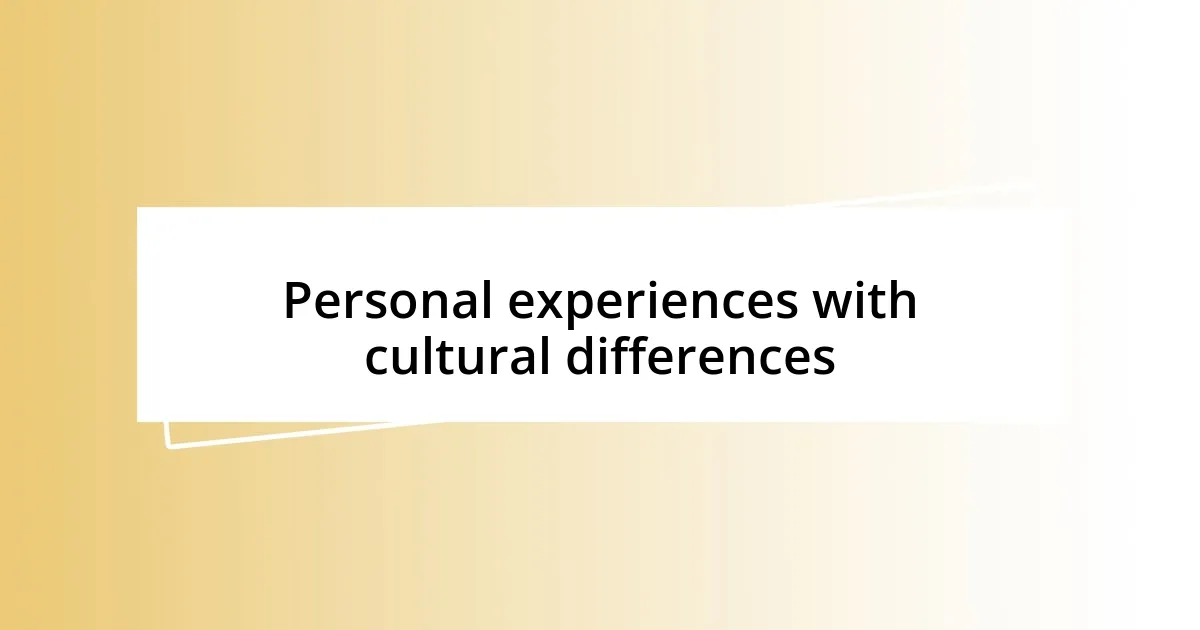
Personal experiences with cultural differences
I remember the first time I joined a potluck dinner with friends from diverse backgrounds. Each dish told a story; the aroma of spices wafted through the air, inviting curiosity and conversation. I felt a wave of appreciation when I tasted a traditional dish that a friend shared from their family recipe. It opened my eyes to how food can bridge cultural gaps—there’s something profoundly connecting in sharing meals that represent one’s heritage.
Not long ago, I was at an international conference where attendees hailed from all over the world. While networking, I encountered various greetings—some embraced, others bowed, and a few merely shook hands. Initially, I felt overwhelmed. However, one enlightening conversation with a colleague from Japan about their bowing customs stood out to me. It made me rethink not just how I greeted others but also how every gesture carries meaning beyond words. I realized those subtle differences could either create connection or confusion.
One experience stands out vividly—volunteering at an intercultural fair. As I watched families showcase their cultural practices, I observed a child in a traditional outfit eagerly explaining its significance to passersby. Their enthusiasm was infectious! It reminded me how important it is to nurture that sense of pride in one’s culture. Each story, whether through dance, art, or attire, painted a larger picture of shared humanity. I learned that when we genuinely celebrate these differences, we invite growth in our own understanding.
| Experience | Insight |
|---|---|
| Potluck Dinner | Food unites and shares stories, bridging cultural gaps. |
| International Conference | Gestures matter; they carry profound meanings beyond words. |
| Intercultural Fair | Celebrating cultural pride fosters understanding and connection. |
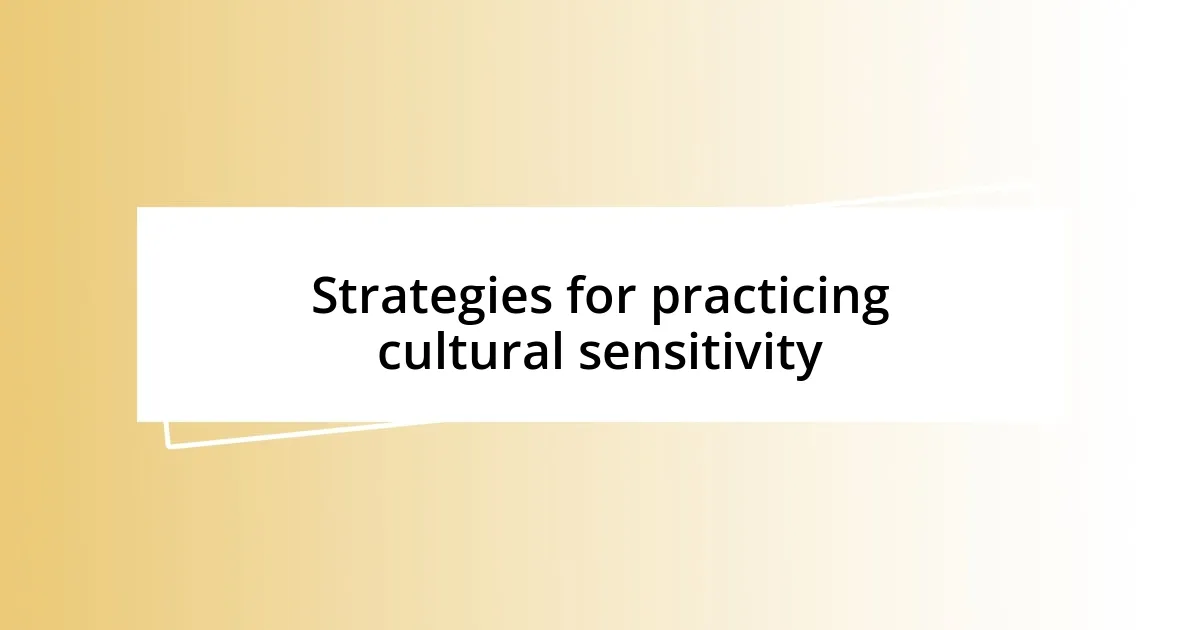
Strategies for practicing cultural sensitivity
When it comes to practicing cultural sensitivity, I have found that active listening plays a pivotal role. I remember attending a community workshop where participants shared their cultural stories. Instead of waiting for my turn to speak, I focused on truly hearing what each person had to say. This not only helped me appreciate their perspectives but also fostered a deeper sense of connection. Have you ever noticed how powerful it can be to simply listen? It creates a safe space for others to express themselves fully.
Another effective strategy I’ve embraced is seeking feedback from individuals of different cultures. I recall asking a colleague from India about my understanding of a particular cultural reference I had misinterpreted. When they explained the nuances, I felt a mix of embarrassment for my misstep and gratitude for their patience. This sparked a conversation that highlighted the importance of continuous learning. Don’t you think that asking questions can unveil a wealth of knowledge? Every conversation is a chance to grow and understand each other better.
Engaging in cultural experiences, such as attending festivals or cultural events, has also become one of my favorite strategies. I vividly remember visiting a cultural festival where locals performed traditional dances and showcased their crafts. It was exhilarating! I found myself dancing with strangers, feeling the rhythm of shared joy. These experiences have shown me that immersing myself in another culture isn’t just enlightening; it can be transformative. Isn’t it fascinating how stepping out of our comfort zones can lead to such rewarding discoveries?
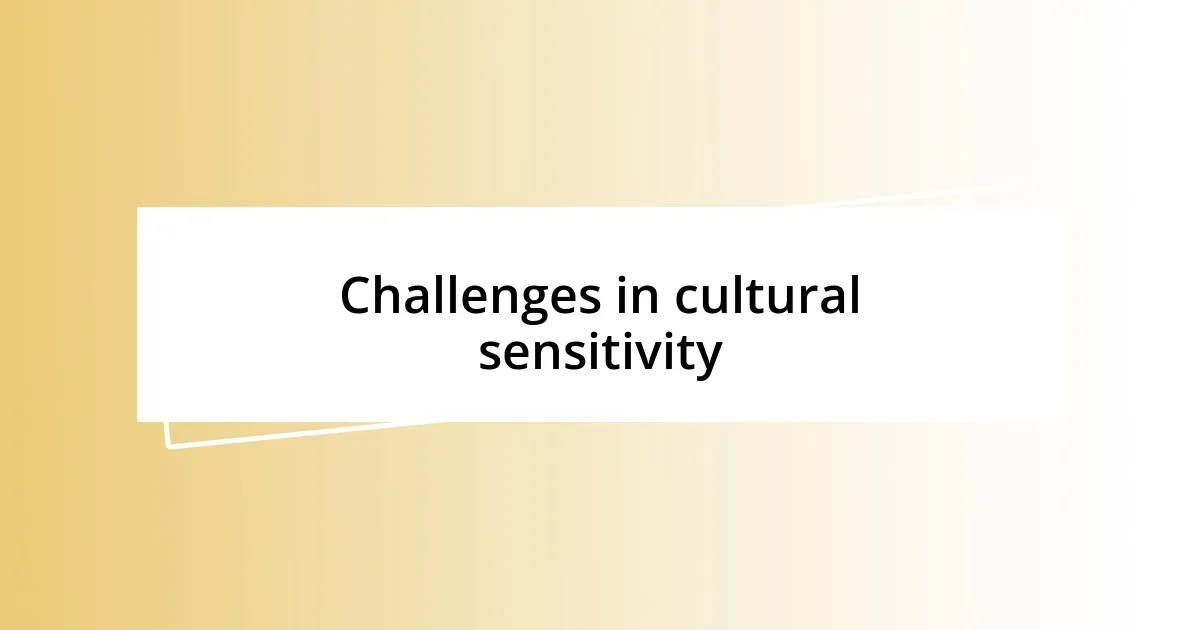
Challenges in cultural sensitivity
When navigating cultural sensitivity, I’ve encountered challenges that often stem from assumptions. For instance, I once attended a workshop that focused on communication styles across different cultures. I shared my perspective, only to realize later that I had misunderstood certain cultural norms. This experience challenged my preconceptions and made me question how much I really know about other cultures. Have you ever found yourself in a situation where your assumptions were put to the test?
Language barriers can also present significant hurdles. I remember trying to connect with a colleague who spoke limited English. Our conversations sometimes felt strained, and I noticed how frustration could easily creep in. This reminded me of the importance of patience and clarity. It’s intriguing how a simple language gap can lead to misinterpretations, isn’t it? It taught me that engagement requires not just words but genuine effort to bridge those gaps.
Moreover, conflicting cultural values can lead to misunderstandings. I was part of a team project where differing beliefs about hierarchy created tension. Some members valued collective decision-making, while others leaned towards individual authority. I found myself navigating these dynamics carefully, seeking common ground. It struck me how vital it is to remain flexible and open-minded in such situations. How do you respond when confronted with differing values? Each encounter has the potential to enrich our understanding—if we’re willing to embrace it.
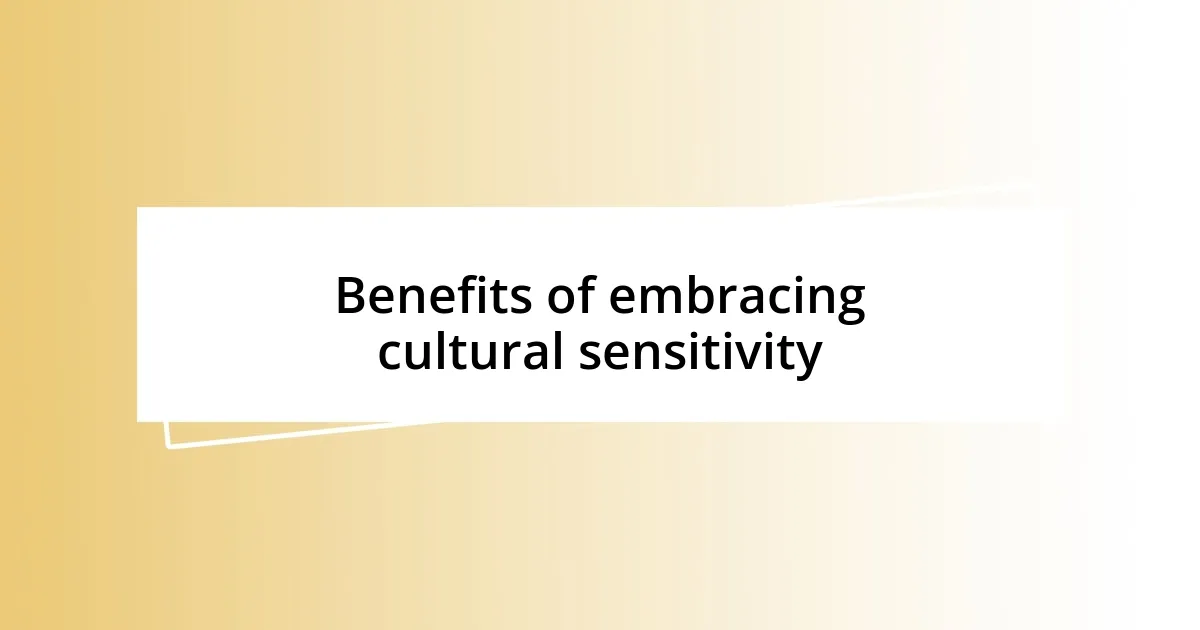
Benefits of embracing cultural sensitivity
Embracing cultural sensitivity has enriched my life in ways I never anticipated. I recall a time when I attended a multicultural potluck at a friend’s house. It was incredible to taste dishes from various cultures, each telling a delicious story of its own. Sharing those meals deepened my appreciation for diversity, reminding me that food is a universal language connecting us all, isn’t it?
One undeniable benefit of cultural sensitivity is the enhanced relationships it fosters. I once collaborated with a team consisting of members from different backgrounds. By being culturally aware and respectful, I noticed that our brainstorming sessions became more vibrant and innovative. This collaborative spirit not only produced great ideas but also strengthened our bonds, leading to lasting friendships. Have you ever experienced how understanding different perspectives can inspire creativity?
Finally, embracing cultural sensitivity has empowered me to reflect on my own identity. I found this to be particularly true during a cultural exchange event at my workplace. Listening to others share their journeys helped me recognize my biases and the cultural influences that shaped my viewpoints. It was a humbling experience, showcasing how self-awareness can lead to personal growth. I can’t help but wonder: How often do we take the time to explore the beautiful complexity of our own identity in relation to others?



